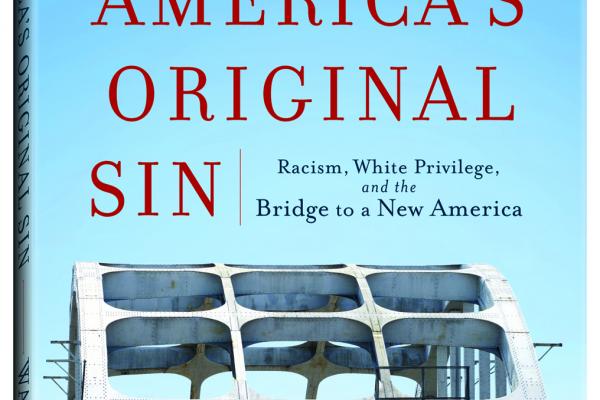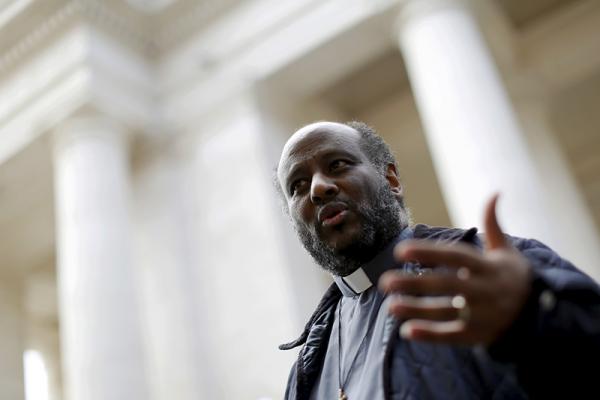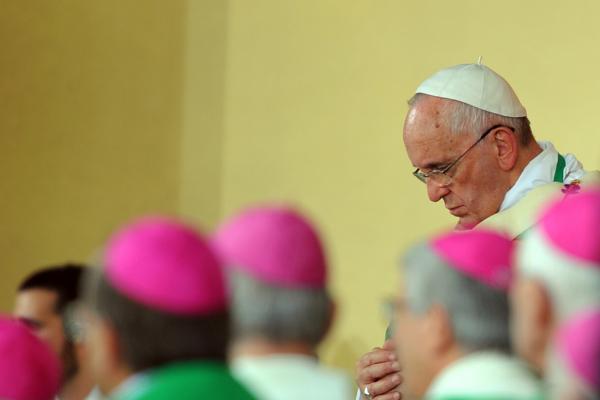When literary critic Steve Moore praised the novel Infinite Jest for its “sardonic worldview perfect for the irony-filled nineties,” the exasperated author, David Foster Wallace, replied that that was “like saying a ‘kerosen[e]-filled fire extinguisher perfect for the blazing housefire.’”
The ’90s may be over, but the scorching irony of our sardonic age shows no sign of dying out as David Foster Wallace may have hoped.
That we still need writers — and artists, thinkers, and plain old human beings — putting out fires of cynicism is clear enough to me. Not because I hate it. The problem is that I love being the cynic.
“When Trayvon Martin was shot and killed, I felt - you might call it the lament of a white father. I knew and the whole country knew that my son Luke — six-foot-tall baseball athlete, going to college next year — had been walking and doing the same thing, same time that Trayvon was doing in Sanford, Fla., everyone knows he would've come back. But Trayvon didn't come back, and so it was a parable. Jesus talked about parables. They teach us things. Michael Brown — Ferguson — was a parable. Charleston was a parable. The parable about where we are as a nation — we have to see our original sin and how it still lingers in our criminal justice system.”
Even as Pope Francis and Catholic leaders from around the world debate ways to make the Catholic Church more inclusive, Newark Archbishop John Myers has given his priests strict guidelines on refusing Communion to Catholics who, for example, support gay marriage or whose own marriage is not valid in the eyes of the church.
In the two-page memo, Myers also orders parishes and Catholic institutions not to host people or organizations that disagree with church teachings.
He says Catholics, “especially ministers and others who represent the Church, should not participate in or be present at religious events or events intended to endorse or support those who reject or ignore Church teaching and Canon Law.”
A surge of migrant deaths in deadly voyages across the Mediterranean Sea has become a modern-day refugee crisis.
But the Rev. Mussie Zerai, a 40-year-old Roman Catholic priest from tiny Eritrea, north of Ethiopia, has moved to help migrants trapped in the North African deserts and rickety wooden boats drifting across the sea.
“It is my duty and moral obligation as a priest to help these people. For me it’s simple: Jesus said we must love one another as we love ourselves,” Zerai said in a telephone interview.
The little-known priest, now based in Rome and Switzerland, was among this year’s nominees for the 2015 Nobel Peace Prize, along with Pope Francis. (The prize, announced Friday, was awarded to the National Dialogue Quartet, which helped build a pluralistic democracy in Tunisia.)
Pope Francis on Oct. 14 asked forgiveness for a series of scandals that have befallen the Vatican and Rome.
Francis did not specify the scandalous events to which he was referring, although the departure of a gay cleric earlier this month may well have been on the pontiff’s mind.
“I ask you for forgiveness for the scandals that have occurred recently either in Rome or in the Vatican,” the pope said during his weekly general audience in St. Peter’s Square.
There are many reasons for divorces and one of them is domestic violence. It’s true that there are women and men who experience domestic violence and never leave the marriage; they only want to cleave while others leave for their dear life. Domestic violence can be viewed as family violence but there are family members from whom we may rarely hear in these situations, namely children. Most certainly, domestic violence impacts the perpetrator and victim yet if there are children in the same space, they, too, will be affected. They, too, may even be beaten, battered, and bruised. This is the blues-inflected struggle of life.
The book of Mark focuses a lot on the suffering of Jesus. Pain seems to have some privilege in the way Mark preaches the gospel. He keeps it real. Mark is a truth-teller because even today many travel a trail of tears. The level of pain and the type of pain vary. But the honest truth is that life is not a bouquet of sweet-smelling roses. There are thorns and fractures. There is brokenness — broken bodies and relationships — so it is of no surprise per se when we see Jesus and the Pharisees engage in a conversation about marriage and divorce, topics that may heighten our awareness of human brokenness in our society. It’s no secret that many marriages fail and end in divorce, whether they are people of faith or not.
This nation needs to make a choice. Does it continue to honor a man whose claim of “discovery” opened the door for centuries of injustice? Or does it openly teach that history, mourn those atrocities, and commit itself to ensuring that it does not happen again?
My daughter is in seventh grade, next year she will be in eighth. She tells me this means she will be “the king of middle school.” She will go to a leadership camp and learn what it means to cultivate leadership qualities in order to be a good king for the underlings in sixth and seventh grade.
And then she will graduate middle school and it’s back to the bottom of the pecking order — one minute a king, the next, a lowly high school freshman. Just when you think you’ve learned everything there is to know comes the swift reminder you are only just beginning.
Out here in the real world, things operate similarly. Motherhood certainly took me through the same cruel pattern. After floundering sleeplessly, aimlessly, in a constant panicked state through the first few newborn months, I thought I’d mastered this parenting thing. I could interpret my newborn’s cries, predict when she would go down for her nap within a half hour margin of error, and change a diaper by rote.
Democratic contenders in the 2016 presidential election take their turn at the debate lecterns Oct. 13, and it’s anyone’s guess if it will be a battle of contesting moral visions or a policy snooze-fest.
Under the CNN stage lights: social-gospel Methodist Hillary Rodham Clinton; secular Jew Bernie Sanders; loud and proud Catholic Martin O’Malley; and two Protestant men who rarely speak from the faith angle — Jim Webb and Lincoln Chafee.
How do we measure our success? Matthew 6:19-21 warns us against putting our store in earthly things, which are temporary, but American capitalist culture informs us that the stuff we have — the size, the quality, and how much of it we can afford — is what determines our own worth. As Christians, we try to focus on serving God and loving our neighbors, but often it’s a moment of crisis that reveals where our values truly lie.
The film 99 Homes doesn’t include overtly religious elements, but it features that same battle at the heart of its story, a deal-with-the-devil tale set against the 2008 housing market crash. Writer-director Ramin Bahrani presents the film in an unstylized, utterly human way that explores this question from a dire perspective: how people react when everything they’ve worked hard to earn is yanked away, and they must suddenly re-evaluate their own measures of success.









